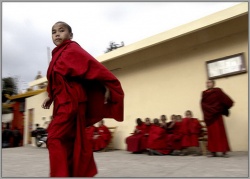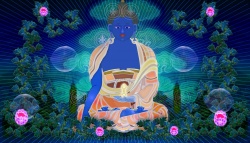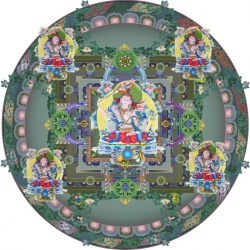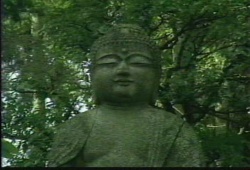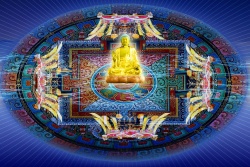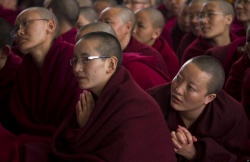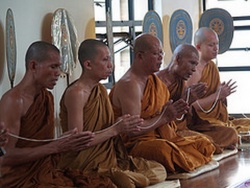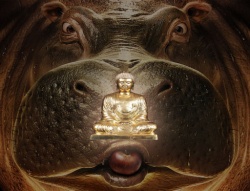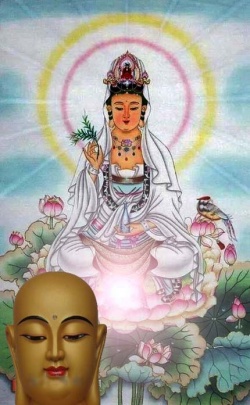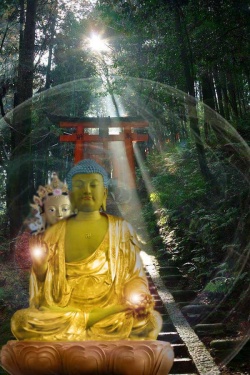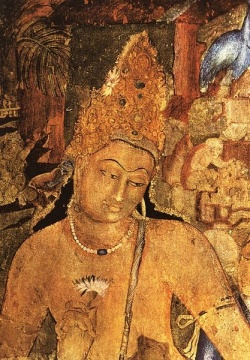Difference between revisions of "Gradual Cultivation and Sudden Enlightenment"
(Created page with " Gradual Cultivation and Sudden Enlightenment This talk was given by Grand Master Wei Chueh on December 22, 2001, at Buddha Gate Monastery. It...") |
m (Text replacement - "fundamental principle " to "fundamental principle ") |
||
| (4 intermediate revisions by the same user not shown) | |||
| Line 1: | Line 1: | ||
| + | <nomobile>{{DisplayImages|1789|2124|4314|337|1398|3983|1091|58|2738|2562|4451|505|89|316|3966|2148|3452|1113|2924|2259|1990|3924|714|4112|4124|4385|3483|2631|86|254}}</nomobile> | ||
| + | [[Gradual Cultivation]] and [[Sudden Enlightenment]] | ||
| − | [[ | + | This talk was given by [[Grand Master]] [[Wei Chueh]] on December 22, 2001, at [[Buddha Gate Monastery]]. |
| − | + | It was translated orally by Ven. [[Jian Hu]], then transcribed and edited into its {{Wiki|present}} [[form]]. | |
| − | Different [[Paths]] to [[Buddhahood | + | Different [[Paths]] to [[Buddhahood]]. |
| − | |||
| − | |||
| − | |||
| − | [[ | + | ===[[What is meant by gradual cultivation?]]=== |
| − | |||
| − | |||
| − | |||
| − | + | It means [[gradual practice]] and [[attainment]], going through the various stages of practice from an ordinary or [[mundane]] being all the way to [[Buddhahood]]. | |
| − | + | Just like going to school, we start from elementary school, go on to junior high, high school, {{Wiki|college}}, eventually earning a {{Wiki|doctorate}} [[degree]]. | |
| − | + | Climbing step by step, we ultimately {{Wiki|perfect}} all [[virtues]] and [[merits]] and reach [[Buddhahood]]-this is called [[gradual cultivation]]. | |
| − | |||
| − | |||
| − | |||
| − | + | ===[[What is meant by sudden enlightenment?]]=== | |
| + | |||
| + | |||
| + | |||
| + | |||
| + | Being [[enlightened]] means that we are [[awakened]] to this {{Wiki|present}} [[mind]], this [[mind]] that is originally [[pure]], this [[awareness]], this [[bodhi mind]]. | ||
| + | |||
| + | When [[enlightened]], this [[mind]] is [[Buddha]], this [[mind]] is the Way. | ||
| + | |||
| + | Once we are [[enlightened]] we still need to maintain this [[enlightened]] [[understanding]] and practice until we achieve [[perfection]]. | ||
| + | |||
| + | This means that whether we are in {{Wiki|motion}} or still, whether it is day or night, the [[mind]] is always free from [[clinging]] and [[delusion]]; it is always clear, [[mindful]], and in control. | ||
| + | |||
| + | Maintaining this [[enlightened state]] until [[perfection]], until [[Buddhahood]] is reached, is the practice of [[sudden enlightenment]]. | ||
| + | |||
| + | So, [[sudden enlightenment]] is to realize that if this [[ordinary mind]] in the {{Wiki|present}} is free from any [[effort]] or [[pretension]], then this very [[mind]] is [[wisdom]], [[true suchness]], the profound [[bodhi mind]] of the [[Tathagata]] ([[Buddha]]). | ||
| + | |||
| + | When we are [[enlightened]] then we realize that everyone possesses [[Buddha nature]], that everyone can become a [[bodhisattva]]. | ||
| + | |||
| + | When we are [[awakened]] we realize how [[precious]] and real we are and that all [[human beings]] in this [[world]] are endowed with [[infinite]] {{Wiki|hope}} and [[infinite life]]. | ||
| + | |||
| + | [[Gradual cultivation]] means to attain the fundamental principle by way of (perfecting our) [[actions]]. | ||
| + | |||
| + | [[Sudden enlightenment]] means to realize the fundamental [[essence]] first and then {{Wiki|perfect}} our [[actions]]. | ||
| + | |||
| + | If we don't have the chance or [[causal conditions]] to practice [[sudden enlightenment]] then we can practice [[gradual cultivation]]. | ||
| + | |||
| + | It may seem that [[gradual cultivation]] and [[sudden enlightenment]] are very different methods but in fact they are compatible and not conflictive. | ||
| + | |||
| + | |||
| + | |||
| + | |||
| + | ===[[Relative Truths]] and [[Absolute Truths]]=== | ||
| + | |||
| + | |||
| + | |||
| + | ===[[Buddhism is the truth of our life]]=== | ||
| + | |||
| + | |||
| + | |||
| + | |||
| + | In terms of [[the highest truth]], there is just one, but there are also [[conventional truths]]. | ||
| + | |||
| + | For example, [[family]] [[ethics]] is a kind of [[conventional truth]]; the {{Wiki|rules}} and regulations of a school are also [[conventional truths]]. {{Wiki|Social}} order is also a kind of [[truth]]. | ||
| + | |||
| + | However, the [[Buddha Dharma]] is the truest of all [[truths]]. | ||
| + | |||
| + | The [[principle]] of [[gradual cultivation]] and [[sudden enlightenment]] is the truest of all [[truths]] in [[Buddhism]]. | ||
| + | |||
| + | There are many [[conventional truths]], but they change with [[time and space]]. | ||
| + | |||
| + | The [[Buddha Dharma]] does not change with [[time and space]]. | ||
| + | |||
| + | [[Worldly]] laws or [[truths]] change with [[time and space]] because they are [[relative truths]]. | ||
| + | |||
| + | For example, what is considered good and right in the [[Wikipedia:United States of America (USA)|United States]] may not be the case in {{Wiki|Mainland China}} or [[Taiwan]]. | ||
| + | |||
| + | This is because in the [[Wikipedia:United States of America (USA)|United States]], in [[China]], and in [[Taiwan]], lifestyles, cultures, and histories are different. | ||
| + | |||
| + | In some places, such as {{Wiki|Afghanistan}} and some tribes in [[China]], a husband can have several wives, while most other countries believe in [[monogamy]]. | ||
| + | |||
| + | Who is right? Who is wrong? | ||
| + | |||
| + | It is not easy to say for sure. | ||
| + | |||
| + | This is because with different times and different places, the [[nature]] of this kind of [[morality]], {{Wiki|culture}}, or history changes. | ||
| + | |||
| + | |||
| + | |||
| + | ===This is called [[relative truth]]=== | ||
| + | |||
| + | |||
| + | |||
| + | The [[truth]] that we want to discuss today doesn't change with [[time and space]]; it is the same in the {{Wiki|past}} as it is in the {{Wiki|present}} day. | ||
| + | |||
| + | This [[truth]] is that everyone has this [[mind]], this [[sentient]] [[mind]], regardless of race, age or [[gender]]. Everywhere in the [[world]], everyone in the {{Wiki|past}}, {{Wiki|present}} or {{Wiki|future}} has this [[mind]]. | ||
| + | |||
| + | This is a fact. | ||
| + | |||
| + | It is the [[absolute]]. | ||
| + | |||
| + | The [[Platform Sutra]] of the [[sixth Patriarch]] states that, "In terms of [[space]], there are [[east]], [[west]], [[north]] and [[south]]; in terms of [[people]], there are rich, poor, [[noble]] and common; | ||
| + | |||
| + | but this [[mind]] that everyone has is neither in the [[east]], [[west]], [[north]] nor [[south]]; neither rich, poor, [[noble]] nor common; | ||
| + | |||
| + | neither {{Wiki|male}}, {{Wiki|female}}, old nor young." So this is an [[absolute truth]]. | ||
| + | |||
| + | Just like when we say that everyone has [[life]]; everyone wants to stay alive and is afraid of [[death]]. | ||
| + | |||
| + | We all want to be [[happy]] and to avoid [[suffering]]. | ||
| + | |||
| + | In this [[respect]] everyone is the same. | ||
| + | |||
| + | So the [[sutras]] tell us that everyone can be a [[bodhisattva]] or a [[Buddha]] since everyone has this [[mind]], this [[awareness]]. | ||
| + | |||
| + | Because of this, we should cherish and take [[care]] of ourselves, and we also should [[respect]] and [[care]] for the [[lives]] of others. | ||
| + | |||
| + | Even though we all have this [[mind]] or [[awareness]], the level of [[wisdom]] and [[compassion]] that is generated from each being is different. Why are there such differences? | ||
| + | |||
| + | If some [[people]] are wiser than others, it doesn't mean that they have more [[awareness]] than others; it just means that their [[minds]] are clearer. | ||
| + | |||
| + | They have less {{Wiki|discrimination}}, vexations, and [[delusions]]. | ||
| + | |||
| + | When [[people]] don't a have a high level of [[wisdom]], they have more deviant [[views]] and more [[attachments]], which delude the [[mind]]. | ||
| + | |||
| + | So we should understand that everyone is {{Wiki|equal}} in their [[inherent]] [[awareness]] but with varying degrees of [[ignorance]] and vexations that determine how [[wise]] we are, how rich or poor we are, how [[happy]] or [[unhappy]] we are. | ||
| + | |||
| + | It can even affect our [[life span]]. | ||
| + | |||
| + | If we wish to reach the highest state, we need to [[practice Buddhism]] diligently. | ||
| + | |||
| + | |||
| + | |||
| + | |||
| + | ===[[The Four Stages of Achievement]]=== | ||
| + | |||
| + | |||
| + | |||
| + | |||
| + | There are [[four different levels of achievement]] leading to the highest state. | ||
| + | |||
| + | |||
| + | The first level is that of the [[arhat]]. | ||
| + | |||
| + | The [[arhat's wisdom]] and [[awakening]] are much higher than those of the ordinary being. | ||
| + | |||
| + | |||
| + | |||
| + | The second level is called the [[pratyekabuddha]]. | ||
| + | |||
| + | The [[pratyekabuddha's]] [[wisdom]] and [[mind]] surpass those of the [[arhat]]. | ||
| + | |||
| + | |||
| + | |||
| + | The third level is called the [[bodhisattva]]. | ||
| + | |||
| + | If [[bodhisattvas]] can, in addition, remove the "[[ignorance]] of [[Dharmas]]" (the lack of [[knowledge]] to understand and teach all the different [[paths]] to [[enlightenment]] to all [[beings]]), then they have surpassed the [[pratyekabuddha]]. | ||
| + | |||
| + | |||
| + | |||
| + | Finally, the [[fourth stage]] is that of the [[Tathagata]] or the [[Buddha]]. | ||
| + | |||
| + | |||
| + | |||
| + | The [[Buddha]] has eradicated all the three different kinds of [[ignorance]] (the [[ignorance]] of delusive [[views]] and [[habits]], the [[ignorance]] of [[Dharmas]], and the [[ignorance]] of [[beginningless]] [[delusion]]) and has reached [[perfection]]. | ||
| + | |||
| + | [[Arhat]], [[pratyekabuddha]], [[bodhisattva]], and [[Buddha]] are the four levels of [[enlightenment]]. Only the [[Buddha's enlightenment]] is the most complete. | ||
| + | |||
| + | These are the four kinds of [[saints]] in [[Buddhism]]; each one of them has achieved a higher [[degree]] of [[perfection]] than [[ordinary beings]]. | ||
| + | |||
| + | |||
| + | |||
| + | What does it mean to be a [[saint]], a [[holy one]]? | ||
| + | |||
| + | |||
| + | |||
| + | It means that if the [[mind]], this very [[mind]] that is listening to the lecture now, can {{Wiki|purify}} its [[afflictions]] and eradicate its [[attachments]], then this [[mind]] is exactly the same as the [[mind of the Buddha]]. | ||
| + | |||
| + | How do we reach the [[state]] of the [[Tathagata]] or [[Buddhahood]]? | ||
| + | |||
| + | There are [[two paths]]: the first is [[gradual cultivation]] and the second is [[sudden enlightenment]]. | ||
| + | |||
| + | |||
| + | |||
| + | ===The [[Path of Gradual Cultivation]]=== | ||
| + | |||
| + | |||
| + | |||
| + | The [[path]] of [[gradual cultivation]] means to practice the [[six paramitas]]-[[charity]], [[moral conduct]], [[tolerance]], [[diligence]], [[meditation]], and [[prajna]] [[wisdom]]. | ||
| + | |||
| + | |||
| + | These are the [[vows]] and conducts of the [[bodhisattva]]. | ||
| + | |||
| + | By perfecting these [[six paramitas]], one will reach [[Buddhahood]]. | ||
| + | |||
| + | To achieve [[perfection]] one must do so first in terms of time, and second in terms of [[merit]]. | ||
| + | |||
| + | In terms of time, it is like going to school; it takes so many years to complete elementary school, high school, {{Wiki|college}}, and so on. | ||
| + | |||
| + | Besides the time it takes, one also needs to finish the required courses; this is {{Wiki|equivalent}} to perfecting the [[merit]]. | ||
| + | |||
| + | In terms of time, it takes a [[bodhisattva]] three [[asamkheya kalpas]] ([[eons]]) to reach [[perfection]]. | ||
| + | |||
| + | In terms of [[merit]], the [[six paramitas]] need to be completed. | ||
| + | |||
| + | |||
| + | |||
| + | ===What are [[three asamkheya kalpas]]=== | ||
| + | |||
| + | |||
| + | |||
| + | A [[kalpa]] is a measurement of time much longer than a million or even a billion years. | ||
| + | |||
| + | There are three different kinds of [[kalpas]]: the small, middle and large [[kalpas]]. | ||
| + | |||
| + | What is a [[small kalpa]]? | ||
| + | |||
| + | Originally, the [[life span]] of a [[human being]] is 84,000 years. On average, every one hundred years, [[Wikipedia:Human life|human life]] span {{Wiki|decreases}} by one year until the average [[life span]] is only 10 years. | ||
| + | |||
| + | Then, every hundred years it will increase by one year until it reaches 84,000 years again. | ||
| + | |||
| + | This whole span is called one [[small kalpa]]. | ||
| + | |||
| + | |||
| + | A [[middle kalpa]] is {{Wiki|equal}} to 20 [[small kalpas]]. | ||
| + | |||
| + | It takes four middle [[kalpas]] to complete the four stages of the [[life]] of the [[universe]]: [[birth]], abiding, deterioration, and [[emptiness]]. | ||
| + | |||
| + | |||
| + | A large [[kalpa]] is {{Wiki|equal}} to four middle [[kalpas]], which is one cycle of the [[universe]]. | ||
| + | |||
| + | It takes countless large [[kalpas]] to make one "[[asamkheya]]" [[kalpa]] and it takes three [[asamkheya kalpas]] to complete the [[path of a bodhisattva]]. | ||
| + | |||
| + | |||
| + | It takes that long for a [[bodhisattva]] to complete the [[six paramitas]]. | ||
| + | |||
| + | The [[Charity]] [[Paramita]] [[Charity]] is the first of the [[six paramitas]]. | ||
| + | |||
| + | |||
| + | How does one {{Wiki|perfect}} the [[charity]] [[paramita]]? | ||
| + | |||
| + | |||
| + | Contrary to what some may think, donating a million or even a billion dollars doesn't constitute the [[perfection]] of [[charity]]. | ||
| + | |||
| + | Aside from the giving of [[money]] and property, we need to be willing to give up everything we [[own]], even our [[life]], in order to {{Wiki|perfect}} the [[charity]] [[paramita]]. | ||
| + | |||
| + | In his [[previous lives]], [[charity]] was the first thing that [[Sakyamuni Buddha]] practiced. | ||
| + | |||
| + | In order to save a dove, he cut off his [[own]] flesh to feed an {{Wiki|eagle}}; he fed himself to hungry [[tigers]] so they wouldn't starve to [[death]]. | ||
| + | |||
| + | These are examples of giving up one's [[life]] for others. | ||
| + | |||
| + | In a previous [[lifetime]], when the [[Buddha]] was a {{Wiki|prince}}, there was a drought in the country and [[people]] were starving. He gave all the [[treasures]] and [[food]] in the palace to the [[people]]. | ||
| + | |||
| + | His father, the [[king]], became worried and told his son, "If you continue giving this way, there'll be nothing left in the palace and our {{Wiki|rule}} will come to an end." so the [[king]] expelled the {{Wiki|prince}} from the palace. | ||
| + | |||
| + | Even though he was exiled and owned nothing, the {{Wiki|prince}} still wanted to help the [[people]]. | ||
| + | |||
| + | He remembered that the [[dragon king]] of the ocean had a [[Mani pearl]], which can fulfill all of one's wishes. | ||
| + | |||
| + | He tried many ways to obtain the [[Mani pearl]] from the [[dragon king]] but failed. | ||
| + | |||
| + | In desperation, he set forth to [[empty]] the ocean [[water]]. | ||
| + | |||
| + | Drawing the [[water]] with buckets day after day, he exhausted himself and finally fainted. | ||
| + | |||
| + | His sincerity deeply moved the [[four heavenly kings]] who then proceeded to help him; with their [[powers]] they emptied half of the ocean in half an hour. | ||
| + | |||
| + | The [[dragon king]], startled and moved by the sincerity of the {{Wiki|prince}}, voluntarily gave the Mani {{Wiki|pearl}} to the {{Wiki|prince}}. | ||
| + | |||
| + | |||
| + | |||
| + | This is an example of trying to {{Wiki|perfect}} the [[charity]] [[paramita]]. | ||
| + | |||
| + | Every other [[paramita]] needs to be perfected, and this takes three [[asamkheya kalpas]]. | ||
| + | |||
| + | In addition, another hundred [[small kalpas]] are needed to {{Wiki|perfect}} the [[thirty-two marks]] and eighty fine [[characteristics]] of the [[Buddha]]. | ||
| + | |||
| + | |||
| + | The [[sutras]] describe the [[thirty-two marks of the Buddha]]. | ||
| + | |||
| + | |||
| + | An example is [[brahma]]-[[sound]], which means that when he speaks, [[people]] of all different {{Wiki|dialects}} are able to understand him; {{Wiki|Chinese}}-, [[Japanese]]-, English-speaking [[people]] and even [[animals]] are able to understand his words without any translation. | ||
| + | |||
| + | Another mark of the [[Buddha]] is that anything he eats always {{Wiki|tastes}} {{Wiki|excellent}}. | ||
| + | |||
| + | In contrast, we have to season our [[food]] for it to {{Wiki|taste}} good to us. | ||
| + | |||
| + | |||
| + | How does one accomplish the [[thirty-two marks]]? | ||
| + | |||
| + | |||
| + | Within each of the [[thirty-two marks]], there are eighty fine features and it takes great [[merits]] to accomplish each of these marks. | ||
| + | |||
| + | |||
| + | |||
| + | What does it take to accomplish the [[merits]] for one mark of the [[Buddha]]? | ||
| + | |||
| + | |||
| + | We consider [[deeds]] such as building a [[temple]] or saving a [[life]] to be of great [[merit]], but these are very far from the [[merits]] of the [[Buddha]]. | ||
| + | |||
| + | The [[scripture]] says that if everyone in the [[world]] became sick and was about to [[die]], and you cured everyone with the [[medicine]] you had, that is an example of the [[merits]] needed to accomplish one of these marks of the [[Buddha]]. | ||
| + | |||
| + | We can see that it is not easy to do these great [[deeds]], to complete the [[six paramitas]], to cultivate for three [[asamkheya kalpas]] and to become a [[Buddha]]. | ||
| + | |||
| + | The Method of [[Sudden Enlightenment]] Because the [[Buddha]] knew that many [[people]] would think that this was a long and difficult [[path]], he [[taught]] us another method-[[sudden enlightenment]] of the [[true mind]] and directly [[realizing]] [[Buddhahood]], which doesn't take three [[asamkheya kalpas]]. This is the method of [[sudden enlightenment]]. | ||
| + | |||
| + | An analogy is [[education]]; normally one goes through elementary school, junior high, high school, and then to {{Wiki|college}}. | ||
| + | |||
| + | But some students who are smart can skip some grades in high school and go directly to {{Wiki|college}}. | ||
| + | |||
| + | I believe that after having heard of [[gradual cultivation]] and [[sudden enlightenment]], all of you will probably want to practice the [[sudden enlightenment]] method. | ||
| + | |||
| + | [[Sakyamuni Buddha]] had to go through three [[asamkheya kalpas]] and he doesn't want us to [[suffer]] the same way unnecessarily. | ||
| + | |||
| + | That is exactly what we will be [[teaching]] in the seven day [[Zen]] [[retreat]]. | ||
| + | |||
| + | You will learn how to realize the [[true nature of the mind]] and become a [[Buddha]]. | ||
| + | |||
| + | The Four Stages of [[Thought]] [[Sudden enlightenment]] is to understand, as the [[sutra]] says, "A [[mind]] without [[mundane]] [[defilement]] is the way to [[supreme enlightenment]]." | ||
| + | |||
| + | That is, the [[ordinary mind]] is the [[Buddha mind]]. | ||
| + | |||
| + | Everyone has a [[mind]], but of all the [[thoughts]] in your [[mind]], which is the [[Buddha]]? | ||
| + | |||
| + | For example, when you are thirsty, the [[thought]] of wanting to drink [[water]] arises. | ||
| + | |||
| + | When you see a cup of [[water]], the [[thought]] of picking up the cup arises, and when you take a sip, the [[thought]] of picking up the cup has ceased and it is the [[thought]] of drinking that is in your [[mind]]. | ||
| + | |||
| + | When you first take a sip, the [[thought]] that "this is good!" arises. | ||
| + | |||
| + | When you take the second sip, the [[thought]] becomes less intense, and when you take the third sip, you don't want to drink anymore. | ||
| + | |||
| + | By this time the [[thought]] of drinking the [[water]] has ceased. | ||
| + | |||
| + | Then you see a cookie in front of you so another [[thought]] arises, "I want to eat the cookie." In every single [[thought]] there are four stages--arising, abiding, changing, and ceasing. | ||
| + | |||
| + | Each day of our [[lives]] so many [[thoughts]] arise. | ||
| + | |||
| + | This [[mind]] of ours is always going somewhere; we either have good [[thoughts]] or bad [[thoughts]], random [[thoughts]] or delusive [[thoughts]]; they are like the waves of the ocean, like bubbles on the waves that come and go so quickly. | ||
| + | |||
| + | All day long our [[mind]] never rests; even at night, our [[mind]] doesn't rest and we [[dream]]. [[Dreaming]] means our [[mind]] is [[clinging]]. | ||
| + | |||
| + | The [[sutra]] says that 840 million [[thoughts]] go by each day and night. | ||
| + | |||
| + | In fact, each [[thought]] that comes and goes is like a [[dream]]. | ||
| + | |||
| + | When we say [[life]] is like a [[dream]] it is not a mere allegory; we are literally living in a [[dream]]. | ||
| + | |||
| + | Every day we [[dream]] about new cars or [[dancing]] or playing mahjong; we [[dream]] about [[money]], [[lust]] or power. | ||
| + | |||
| + | These are our [[dreams]] when we are awake. | ||
| + | |||
| + | Because we are always [[Wikipedia:Dream|dreaming]] during the day, when we are supposed to rest at night, we continue to [[dream]] about what happened in the daytime. | ||
| + | |||
| + | When the [[mind]] is not [[Wikipedia:Dream|dreaming]] then it is asleep. | ||
| + | |||
| + | So we can see that half of our [[life]] is spent on [[sleeping]] and the other half is spent on [[Wikipedia:Dream|dreaming]]. | ||
| + | |||
| + | In [[Buddhism]], these are two of our biggest [[attachments]] and [[delusions]]. | ||
| + | |||
| + | Because our [[thoughts]] are [[subject]] to [[birth]] and [[death]] (they come and go), that is why [[humans]] have [[birth]], [[aging]], {{Wiki|illness}}, and [[death]]. | ||
| + | |||
| + | Every [[thought]] goes through four stages--arising, abiding, changing and ceasing. | ||
| + | |||
| + | For example, when we want to drink [[water]], the [[thought]] of drinking [[water]] arises; when we pick up the cup, the [[thought]] of drinking is abiding; when we take one and then two sips and our [[feelings]] start to change, that is changing; finally we decide we don't want to drink anymore and the [[thought]] goes away. | ||
| + | |||
| + | Because our [[thoughts]] go through these four stages-arising, abiding, changing and ceasing, that is why in our [[lives]] we go through the cycle of [[birth]], [[aging]], {{Wiki|illness}}, and [[death]]. | ||
| + | |||
| + | That is also why this [[world]] comes into being, persists for some time, but eventually deteriorates and becomes [[empty]]. | ||
| + | |||
| + | This [[earth]] is in the "abiding" stage now, but it is always changing; many other {{Wiki|planets}} and {{Wiki|stars}} are also [[aging]], and one day this [[universe]] will perish. | ||
| + | |||
| + | All [[humans]], [[animals]], and [[plants]] go through these four stages. | ||
| + | |||
| + | In order to escape the [[horror]] or {{Wiki|fear}} of living, growing old, getting sick and dying, the [[mind]] must be free from the four stages of coming, abiding, changing and ceasing. | ||
| + | |||
| + | In order to do that we need to realize the [[bodhi mind]], the [[original nature]]. | ||
| + | |||
| + | [[The Platform Sutra of the Sixth Patriarch]] states, "Without [[realizing]] the [[original mind]], all [[Dharma]] {{Wiki|learning}} is in vain." | ||
| + | |||
| + | If we don't realize the [[bodhi mind]], the profound, lucid, [[true mind]], then all the practice we do merely brings [[blessings]] that, although [[pleasant]], are nevertheless [[impermanent]]. | ||
| + | |||
| + | This will not help us much in [[attaining enlightenment]]. So, what is [[enlightenment]]? It means to understand the [[mind]]. | ||
| + | |||
| + | Where is this [[mind]], the very [[mind]] that is listening to the lecture now? | ||
| + | |||
| + | |||
| + | Functions of the [[Mind]] We can understand this [[mind]] from three different perspectives: from its function, from its [[characteristics]], and from its [[essence]]. | ||
| + | |||
| + | How big is our [[mind]]? | ||
| + | |||
| + | |||
| + | Everything in the {{Wiki|past}}, {{Wiki|present}}, and {{Wiki|future}} is contained in this [[mind]]. | ||
| + | |||
| + | The [[world]] in all [[directions]], [[north]], [[south]], [[east]], and [[west]], above and below, all {{Wiki|space and time}} are within our [[mind]]. | ||
| + | |||
| + | The [[mind]] is [[infinite]]; it has no [[boundaries]]. | ||
| + | |||
| + | There is a well-known {{Wiki|Chinese}} saying that the [[mind]] [[knows]] no distance. | ||
| + | |||
| + | The [[mind]] can function regardless of distance, far or near. | ||
| + | |||
| + | For example, with the [[war]] on {{Wiki|terrorism}} that is going on right now, the [[Wikipedia:United States of America (USA)|United States]] and other countries have sent troops to {{Wiki|Afghanistan}}. | ||
| + | |||
| + | Families of the soldiers back home may be very worried. One night the wife may [[dream]] that her husband is sick. She calls and finds out that the soldier is indeed sick. Why is this? | ||
| + | |||
| + | It is because the [[mind]] [[knows]] no distance. No {{Wiki|matter}} how far, whether separated by [[mountains]] or oceans, the [[mind]] can still function. | ||
| + | |||
| + | When the [[mind]] is constantly [[thinking]] about something, we reach a certain level of [[concentration]] that generates power. | ||
| + | |||
| + | We [[sleep]] in a small bed but the [[mind]] can [[dream]] of [[mountains]] and oceans and vast [[space]]. | ||
| + | |||
| + | Sometimes you have good [[dreams]] where you are very [[happy]] and when you wake up it all vanishes. | ||
| + | |||
| + | When you have a nightmare, the {{Wiki|fear}} you have is very real. | ||
| + | |||
| + | Your [[dreams]] seem so real but in fact they are really intangible. | ||
| + | |||
| + | These are all the functions of the [[mind]]. | ||
| + | |||
| + | A [[blind]] [[person]] can walk using a walking stick. | ||
| + | |||
| + | There are [[blind]] {{Wiki|artists}} who can make sculptures. | ||
| + | |||
| + | This is what the [[mind]] can do when it is very [[concentrated]]. | ||
| + | |||
| + | This [[mind]] is very profound and {{Wiki|subtle}}. | ||
| + | |||
| + | [[People]] are used to using their [[eyes]] to look outward and their [[ears]] to listen to outside {{Wiki|sounds}}. | ||
| + | |||
| + | If we can learn to look inward and listen within, we will be able to reach [[tranquility]] and [[peace]] very quickly. | ||
| + | |||
| + | There once was a {{Wiki|Chinese}} man who had severe {{Wiki|arthritis}} and had been bedridden for eight [[or nine]] years. | ||
| + | |||
| + | One day the house suddenly caught [[fire]] and everyone in his [[family]] grabbed their [[precious]] belongings and escaped outside. | ||
| + | |||
| + | After the house burned down, they suddenly remembered that the sick man was still inside the house. | ||
| + | |||
| + | Surely he was killed! Everyone felt very sorry and mourned for him. | ||
| + | |||
| + | Suddenly, they heard the man yelling from a [[hill]] asking them to bring him down. | ||
| + | |||
| + | Surprised, they asked him how he got up there in the first place. | ||
| + | |||
| + | He said that when he saw the [[fire]], he forgot about his {{Wiki|arthritis}} and ran up the [[hill]]! | ||
| + | |||
| + | They said, "If you could go up, you can come down the same way." | ||
| + | |||
| + | He said, "But my {{Wiki|arthritis}} hurts so badly that I cannot move!" If we can learn to focus the [[mind]], it can be very powerful. | ||
| + | |||
| + | [[Practicing the Dharma]] and [[meditation]] teaches us how to focus and use our [[mind]]. | ||
| + | |||
| + | To use this [[mind]] we need to [[awaken]] the [[mind]]. | ||
| + | |||
| + | Once [[awakened]], we can {{Wiki|purify}} the [[mind]]. | ||
| + | |||
| + | Then we can return to the original source. | ||
| + | |||
| + | That is what we mean by: "To [[enlighten]] the [[mind]] is to realize the [[true nature]], to realize the [[true nature]] is to become a [[Buddha]]." | ||
| + | |||
| + | Once [[enlightened]], one is the [[Buddha]]; unenlightened, one is an ordinary being. | ||
| + | |||
| + | If the [[mind]] has vexations and creates bad [[karmas]] then one falls into the [[suffering]] [[realms]]; if the [[mind]] has [[evil]] [[views]] then one becomes [[the devil]]. | ||
| + | |||
| + | [[Purity]] of the [[Mind]] I think that everyone wants to realize the [[true nature]] of this [[mind]]. | ||
| + | |||
| + | Where is this [[mind]]? | ||
| + | |||
| + | In fact this [[mind]] is right here, all of it is ever-present. | ||
| + | |||
| + | The great [[Zen master]] [[Bodhidharma]] has said, "In your [[eyes]], it is called [[seeing]]; in your [[ears]], it is called hearing; in your {{Wiki|nose}}, you can {{Wiki|smell}} the {{Wiki|fragrance}}; | ||
| + | |||
| + | in your {{Wiki|tongue}}, you can detect the sweetness, sourness, and all the [[flavors]] of the [[food]]; in your hands you can grab things, and in your feet it is the walking." | ||
| + | |||
| + | These are all functions of the [[mind]]. | ||
| + | |||
| + | So if everyone has this [[mind]] already, why can't we all become [[Buddhas]]? | ||
| + | |||
| + | It is because of our [[delusions]] and [[attachments]]. | ||
| + | |||
| + | If we can get rid of these two problems, our [[mind]] will be like still [[water]] or like a clear [[mirror]]; our [[mind]] can radiate {{Wiki|light}} and move the [[earth]]. | ||
| + | |||
| + | [[People]] use their [[eyes]] to look at the outside [[world]]; when we see the good and the bad then we start to discriminate and [[mental afflictions]] arise. | ||
| + | |||
| + | When our [[ears]] hear others praising us, we are overjoyed, and when others criticize us, we become [[angry]]. | ||
| + | |||
| + | So, [[afflictions]] and prejudice often arise from the [[eyes]], [[ears]], {{Wiki|nose}}, {{Wiki|tongue}}, [[body]], and [[mind]]. | ||
| + | |||
| + | In this way our [[mind]] is like a pool of muddy [[water]], unable to produce great power, unable to function wisely. | ||
| + | |||
| + | It is important for us to reflect and examine ourselves. | ||
| + | |||
| + | When our [[eyes]] see things we should not [[cling]] to them; when receiving praise we should not be overjoyed; when slandered we should not be upset. | ||
| + | |||
| + | At all times the [[mind]] remains [[calm]] and [[peaceful]]. | ||
| + | |||
| + | This is what the [[Diamond Sutra]] says, "Let the [[mind]] function without abiding." | ||
| + | |||
| + | When our [[six sense organs]] ([[eyes]], [[ears]], ¡[[Consciousness]]) are in [[contact]] with the six "dusts" ([[form]], [[sound]], ¡K [[dharmas]]), we will know what is right or wrong; | ||
| + | |||
| + | we will know what is bad or good and yet the [[mind]] is not polluted. We are fully {{Wiki|aware}} yet we do not [[crave]] or [[cling]] to things. | ||
| + | |||
| + | In this way our [[senses]] revert to [[purity]]. | ||
| + | |||
| + | A [[Zen master]] once said that [[Zen practice]] is to "walk through a [[flower]] field / without a single leaf [[clinging]] on you." | ||
| + | |||
| + | What does that mean? | ||
| + | |||
| + | It means that everywhere we go and in everything we do, the [[mind]] is free from [[attachment]] and [[delusions]]. | ||
| + | |||
| + | We are {{Wiki|aware}} but we do not [[cling]]. | ||
| + | |||
| + | This is how we {{Wiki|purify}} the [[mind]] and our [[sense organs]]. | ||
| + | |||
| + | This is called sitting on the platform of white [[lotuses]]. | ||
| + | |||
| + | The [[lotus]] blossom grows out of dirty muddy [[water]] but it is very pristine and [[pure]]. | ||
| + | |||
| + | Our [[mind]] should be like that, [[rising]] from [[impurities]] but free from contamination. | ||
| + | |||
| + | A Bird's [[Buddha Nature]] There is another story to help you realize that this [[awareness]] is the [[Buddha nature]]. | ||
| + | |||
| + | Do not have a single trace of [[doubt]], because if you do, it will be difficult to [[attain enlightenment]]. | ||
| + | |||
| + | There was a [[prime minister]] whose [[name]] was Pei Du; he was a devout [[Buddhist]] and studied [[Buddhism]] in depth. | ||
| + | |||
| + | One day, while he was in the great [[Xiang]] Guo [[Monastery]], he saw a sparrow that landed on top of the [[Buddha]] statue's head, left his droppings and flew away. | ||
| + | |||
| + | The [[prime minister]] was very disturbed by this scene and started [[thinking]]: the [[scriptures]] say that every [[sentient being]] has [[Buddha nature]] so a sparrow certainly does also; but why did this bird leave his droppings on the [[Buddha's]] head? | ||
| + | |||
| + | So Pei Du asked the [[abbot]] of the [[temple]] for an explanation. | ||
| + | |||
| + | The [[abbot]] responded by saying that certainly the sparrow has [[Buddha nature]]. | ||
| + | |||
| + | Indeed it is very {{Wiki|intelligent}}; it [[knows]] that [[Buddha]] is very [[compassionate]], that is why it left its droppings on the head of the [[Buddha]] instead of leaving it on the head of a {{Wiki|hawk}}! So the fact that the sparrow [[knows]] where it is safe and where it is not, this "[[knowing]]" is its [[Buddha nature]]. | ||
| + | |||
| + | Don't think that [[Buddha nature]] is something too remote or too profound to understand; it is just this [[mind]] which [[knows]] and which is {{Wiki|aware}}. Everyone has this [[mind]] that can distinguish good from [[evil]], | ||
| + | |||
| + | right from wrong; it is just that this [[mind]] is often deluded and beset with [[afflictions]], thus generating [[karma]] that makes us [[suffer]] and lose our [[calm]] and [[peace]]. | ||
| + | |||
| + | This is the [[mind]] of an [[ordinary person]]. | ||
| + | |||
| + | If we are absolutely clear that we have this [[Buddha nature]] then that is [[enlightenment]]. | ||
| + | |||
| + | Maintaining the [[Enlightened Mind]] Once we are [[enlightened]], we need to maintain this [[Buddha nature]]. | ||
| + | |||
| + | How do we maintain this [[Buddha nature]] (so that it will always [[manifest]])? We approach it in two ways-in stillness and in {{Wiki|motion}}. | ||
| + | |||
| + | "We cultivate it in stillness, and fortify it in {{Wiki|motion}}." When we are in stillness, for example, during a [[Zen]] [[meditation retreat]], when we try to keep this [[awareness]] clear, unscattered, and in control for 3 minutes, 5 minutes and longer, throughout the seven days, we will definitely make immense progress. | ||
| + | |||
| + | In the [[Shurangama Sutra]] it states, "[[Cessation]] of [[delusion]] is [[enlightenment]]." The [[word]] "rest" is very important. | ||
| + | |||
| + | Our [[mind]] is always going, so in sitting [[meditation]] we let the [[mind]] rest and remain unmoved; we do not think about the {{Wiki|past}}, the {{Wiki|present}} or the {{Wiki|future}}. | ||
| + | |||
| + | When we think about the {{Wiki|past}}, we [[cling]] to the {{Wiki|past}}; when we think about the {{Wiki|present}} and the {{Wiki|future}}, we [[cling]] to the {{Wiki|present}} and the {{Wiki|future}}. | ||
| + | |||
| + | The [[Diamond Sutra]] states, "The {{Wiki|past}} [[mind]] is intangible, the {{Wiki|present}} [[mind]] is intangible, and the {{Wiki|future}} [[mind]] is intangible." | ||
| + | |||
| + | The {{Wiki|past}} is already {{Wiki|past}}, there is no way that we can get it back; therefore, it is useless to reminisce about the {{Wiki|past}}. | ||
| + | |||
| + | If the {{Wiki|past}} was [[pleasant]], [[thinking]] about it makes us [[sad]]. | ||
| + | |||
| + | If the {{Wiki|past}} was [[sad]], [[thinking]] about it just adds to our [[suffering]]. | ||
| + | |||
| + | There is no need to think about the {{Wiki|present}}, it is so fleeting; speculating about the {{Wiki|future}} is just [[Wikipedia:Dream|dreaming]]. | ||
| + | |||
| + | So where should the [[mind]] be? It should "function without abiding." | ||
| + | |||
| + | The {{Wiki|past}} is intangible, so do not dwell in the {{Wiki|past}}; the {{Wiki|present}} is intangible, so do not think about the {{Wiki|present}}, then the [[mind]] is not dwelling on the fleeting [[moment]]; | ||
| + | |||
| + | the {{Wiki|future}} is intangible, so do not speculate about the {{Wiki|future}}, then the [[mind]] is not dwelling in {{Wiki|future}} [[dreams]]. | ||
| + | |||
| + | Thus this [[mind]] is clear and without [[deception]], it is the profound [[mind]] of the [[Tathagata]], it is the [[original mind]], our [[original nature]]. | ||
| + | |||
| + | If you can maintain this [[enlightened state]] of [[mind]] for one minute, for three minutes or for ten minutes then you are a [[Buddha]] for one minute, three minutes or ten minutes. | ||
| + | |||
| + | This is called "maintaining the {{Wiki|holy}} [[womb]]." If you can practice this way then you are truly on the [[Path]]. | ||
| + | |||
| + | Many [[people]] want to practice but they don't know where the [[path]] is. | ||
| + | |||
| + | There are many ways of practicing, such as [[chanting]] the [[sutras]], repenting, performing [[good deeds]], and sitting [[meditation]]. If we do all these practices without [[realizing]] the [[true mind]], we are just doing preliminary work. | ||
| + | |||
| + | Because our [[ignorance]] and [[attachment]] are deeply rooted, we need to practice these [[virtuous]] acts to help us temporarily get rid of the pollutants in our [[mind]]. | ||
| + | |||
| + | If we continue practicing this way, when the time is right, our [[original nature]] will suddenly [[manifest]] and we will become [[enlightened]], become [[enlightened]] to this [[mind]] of [[non-abidance]]. | ||
| + | |||
| + | The [[non-abiding]] [[mind]] is the [[absolute truth]]. | ||
| + | |||
| + | It {{Wiki|transcends}} [[time and space]]. | ||
| + | |||
| + | In sitting [[meditation]], it takes just one instant, this one instant in which we realize our original mind-it [[feels]] utterly [[tranquil]], clear and [[pure]], and hours can pass in what seems like a [[moment]]. | ||
| + | |||
| + | As the saying goes, "Living in the mountain/there is no [[sense]] of time/meanwhile in the [[mundane]] world/a thousand years have passed." | ||
| + | |||
| + | "No [[sense]] of time" refers to this [[absolute mind]], where [[time and space]] do not [[exist]]. | ||
| + | |||
| + | This is to go beyond this [[world]]. To go beyond this [[world]] is not something that happens after [[death]]. | ||
| + | |||
| + | If we realize this [[original mind]], we are immediately [[transformed]] from the [[mundane]] to the {{Wiki|holy}}, and our [[world]] becomes the [[Pure Land]]. | ||
| + | |||
| + | [[The Platform Sutra of the Sixth Patriarch]] states, "Having the [[right view]] is to transcend this [[world]]. | ||
| + | |||
| + | Having deviant [[views]] is to remain in the [[mundane world]]." | ||
| + | |||
| + | This is truly the supreme [[right view]], the [[enlightened]] [[understanding]] of the [[Tathagata]]. | ||
| + | |||
| + | Because of the nuances of the [[mind]], the [[world]] that we {{Wiki|perceive}} is also different. | ||
| + | |||
| + | For example, this lecture hall is bright when we turn on the {{Wiki|light}}; it becomes dark when we turn off the {{Wiki|light}}. Is this room dark or bright? | ||
| + | |||
| + | Here in the [[Wikipedia:United States of America (USA)|United States]] it is daytime right now, but in [[Taiwan]] it is nighttime. Is it daytime or nighttime now? During the day [[humans]] see more clearly than at night. | ||
| + | |||
| + | Yet there are many [[animals]] that see more clearly at night. | ||
| + | |||
| + | All the different [[phenomena]] that we {{Wiki|perceive}} are due to our [[awareness]], our [[mind]] that [[perceives]] differently according to varying [[conditions]]. | ||
| + | |||
| + | There is a famous {{Wiki|Chinese}} poem that says, "[[Calmly]] observe and the {{Wiki|myriad}} [[phenomena]] become [[self-evident]]. | ||
| + | |||
| + | [[Nature]] narrates itself perfectly." If the [[mind]] can quiet down then you'll naturally understand many {{Wiki|principles}}. | ||
| + | |||
| + | If the [[mind]] is scattered and restless then it is like trying to admire the [[flowers]] while riding away on a [[horse]], you won't be able to discern anything. | ||
| + | |||
| + | Therefore, "[[Sudden awakening]] to the [[original mind]] and directly becoming a [[Buddha]]" is really very important, very relevant to our living and our [[lives]]. | ||
| + | |||
| + | Unifying the [[Gradual]] and [[Sudden Practices]] I think many [[people]] are beginning to understand the [[nature]] of this [[mind]]; | ||
| + | |||
| + | however, it is still very restless and cluttered; it never stops [[thinking]] about the {{Wiki|past}}, the {{Wiki|present}} and the {{Wiki|future}}; it is endlessly worrying about this and that. | ||
| + | |||
| + | This is a [[Wikipedia:Habit (psychology)|habit]] because all our [[lives]] we have never stopped our [[mind]] for ten minutes. | ||
| + | |||
| + | This practice is quite alien to most of us. | ||
| + | |||
| + | But now we understand this Way. | ||
| + | |||
| + | It is a [[spiritual path]] we must each walk by ourselves. | ||
| + | |||
| + | Everyday we have many scattered [[thoughts]] and when the [[mind]] doesn't have these scattered [[thoughts]], then it dozes off; when the [[mind]] is neither scattered nor dozing off then it is bored; these are three biggest problems of the [[mind]]. | ||
| + | |||
| + | When we try to keep the [[mind]] quiet and cannot do it because of these three problems, then we need to use the method of [[gradual cultivation]]. | ||
| + | |||
| + | Once we overcome these three problems we need to let go of the methods that we use and just keep the [[awareness]]. | ||
| + | |||
| + | If we understand this then we will always know how to practice. | ||
| + | |||
| + | Whether it is the method of [[sudden enlightenment]] or [[gradual cultivation]], both will [[benefit]] us. | ||
| + | |||
| + | The [[scripture]] says that everyone can become a [[Buddha]]. | ||
| + | |||
| + | This is not just an {{Wiki|ideal}} or an [[exaggeration]]. | ||
| + | |||
| + | Indeed everyone truly can become a [[Buddha]]; everyone can be [[transformed]] into a [[holy one]]. | ||
| + | |||
| + | As long as we have persistence, [[faith]], and great [[vow]], we will definitely build a solid foundation in our practice. | ||
| + | |||
| + | Our [[lives]] will be more fulfilling, more meaningful, and we will truly realize [[infinite light]] and [[infinite life]]. | ||
| + | |||
| + | I will give a final example of a [[student]] and a [[teacher]]. | ||
| + | |||
| + | The [[teacher]] explains the course material very clearly and interestingly and the [[student]] listens to it attentively and carefully. | ||
| + | |||
| + | For the [[student]], [[time and space]] seem to disappear; even when a mosquito is biting him he doesn't realize it. Suddenly the [[bell]] rings and he realizes how soon this class has ended. | ||
| + | |||
| + | On the other hand, if the [[teacher]] just reads from a [[book]] and doesn't explain the {{Wiki|principles}} clearly and the [[student]] is having difficulty [[understanding]] or is not [[interested]], | ||
| + | |||
| + | the [[student]] will then look to the left and right and at his watch [[thinking]] why the class hasn't ended yet. | ||
| + | |||
| + | In the same classroom within the same hour, why is there such difference in [[feelings]]? | ||
| + | |||
| + | It is because the [[mind]] is discriminating. | ||
| + | |||
| + | When the [[mind]] is restless, time seems very long. When the [[mind]] is [[concentrated]], an hour passes like a [[single moment]]. | ||
{{R}} | {{R}} | ||
http://www.purifymind.com/GradualSudden.htm | http://www.purifymind.com/GradualSudden.htm | ||
[[Category:Gradual Enlightenment]] | [[Category:Gradual Enlightenment]] | ||
Latest revision as of 03:12, 17 March 2016
Gradual Cultivation and Sudden Enlightenment
This talk was given by Grand Master Wei Chueh on December 22, 2001, at Buddha Gate Monastery.
It was translated orally by Ven. Jian Hu, then transcribed and edited into its present form.
Different Paths to Buddhahood.
What is meant by gradual cultivation?
It means gradual practice and attainment, going through the various stages of practice from an ordinary or mundane being all the way to Buddhahood.
Just like going to school, we start from elementary school, go on to junior high, high school, college, eventually earning a doctorate degree.
Climbing step by step, we ultimately perfect all virtues and merits and reach Buddhahood-this is called gradual cultivation.
What is meant by sudden enlightenment?
Being enlightened means that we are awakened to this present mind, this mind that is originally pure, this awareness, this bodhi mind.
When enlightened, this mind is Buddha, this mind is the Way.
Once we are enlightened we still need to maintain this enlightened understanding and practice until we achieve perfection.
This means that whether we are in motion or still, whether it is day or night, the mind is always free from clinging and delusion; it is always clear, mindful, and in control.
Maintaining this enlightened state until perfection, until Buddhahood is reached, is the practice of sudden enlightenment.
So, sudden enlightenment is to realize that if this ordinary mind in the present is free from any effort or pretension, then this very mind is wisdom, true suchness, the profound bodhi mind of the Tathagata (Buddha).
When we are enlightened then we realize that everyone possesses Buddha nature, that everyone can become a bodhisattva.
When we are awakened we realize how precious and real we are and that all human beings in this world are endowed with infinite hope and infinite life.
Gradual cultivation means to attain the fundamental principle by way of (perfecting our) actions.
Sudden enlightenment means to realize the fundamental essence first and then perfect our actions.
If we don't have the chance or causal conditions to practice sudden enlightenment then we can practice gradual cultivation.
It may seem that gradual cultivation and sudden enlightenment are very different methods but in fact they are compatible and not conflictive.
Relative Truths and Absolute Truths
Buddhism is the truth of our life
In terms of the highest truth, there is just one, but there are also conventional truths.
For example, family ethics is a kind of conventional truth; the rules and regulations of a school are also conventional truths. Social order is also a kind of truth.
However, the Buddha Dharma is the truest of all truths.
The principle of gradual cultivation and sudden enlightenment is the truest of all truths in Buddhism.
There are many conventional truths, but they change with time and space.
The Buddha Dharma does not change with time and space.
Worldly laws or truths change with time and space because they are relative truths.
For example, what is considered good and right in the United States may not be the case in Mainland China or Taiwan.
This is because in the United States, in China, and in Taiwan, lifestyles, cultures, and histories are different.
In some places, such as Afghanistan and some tribes in China, a husband can have several wives, while most other countries believe in monogamy.
Who is right? Who is wrong?
It is not easy to say for sure.
This is because with different times and different places, the nature of this kind of morality, culture, or history changes.
This is called relative truth
The truth that we want to discuss today doesn't change with time and space; it is the same in the past as it is in the present day.
This truth is that everyone has this mind, this sentient mind, regardless of race, age or gender. Everywhere in the world, everyone in the past, present or future has this mind.
This is a fact.
It is the absolute.
The Platform Sutra of the sixth Patriarch states that, "In terms of space, there are east, west, north and south; in terms of people, there are rich, poor, noble and common;
but this mind that everyone has is neither in the east, west, north nor south; neither rich, poor, noble nor common;
neither male, female, old nor young." So this is an absolute truth.
Just like when we say that everyone has life; everyone wants to stay alive and is afraid of death.
We all want to be happy and to avoid suffering.
In this respect everyone is the same.
So the sutras tell us that everyone can be a bodhisattva or a Buddha since everyone has this mind, this awareness.
Because of this, we should cherish and take care of ourselves, and we also should respect and care for the lives of others.
Even though we all have this mind or awareness, the level of wisdom and compassion that is generated from each being is different. Why are there such differences?
If some people are wiser than others, it doesn't mean that they have more awareness than others; it just means that their minds are clearer.
They have less discrimination, vexations, and delusions.
When people don't a have a high level of wisdom, they have more deviant views and more attachments, which delude the mind.
So we should understand that everyone is equal in their inherent awareness but with varying degrees of ignorance and vexations that determine how wise we are, how rich or poor we are, how happy or unhappy we are.
It can even affect our life span.
If we wish to reach the highest state, we need to practice Buddhism diligently.
The Four Stages of Achievement
There are four different levels of achievement leading to the highest state.
The first level is that of the arhat.
The arhat's wisdom and awakening are much higher than those of the ordinary being.
The second level is called the pratyekabuddha.
The pratyekabuddha's wisdom and mind surpass those of the arhat.
The third level is called the bodhisattva.
If bodhisattvas can, in addition, remove the "ignorance of Dharmas" (the lack of knowledge to understand and teach all the different paths to enlightenment to all beings), then they have surpassed the pratyekabuddha.
Finally, the fourth stage is that of the Tathagata or the Buddha.
The Buddha has eradicated all the three different kinds of ignorance (the ignorance of delusive views and habits, the ignorance of Dharmas, and the ignorance of beginningless delusion) and has reached perfection.
Arhat, pratyekabuddha, bodhisattva, and Buddha are the four levels of enlightenment. Only the Buddha's enlightenment is the most complete.
These are the four kinds of saints in Buddhism; each one of them has achieved a higher degree of perfection than ordinary beings.
What does it mean to be a saint, a holy one?
It means that if the mind, this very mind that is listening to the lecture now, can purify its afflictions and eradicate its attachments, then this mind is exactly the same as the mind of the Buddha.
How do we reach the state of the Tathagata or Buddhahood?
There are two paths: the first is gradual cultivation and the second is sudden enlightenment.
The Path of Gradual Cultivation
The path of gradual cultivation means to practice the six paramitas-charity, moral conduct, tolerance, diligence, meditation, and prajna wisdom.
These are the vows and conducts of the bodhisattva.
By perfecting these six paramitas, one will reach Buddhahood.
To achieve perfection one must do so first in terms of time, and second in terms of merit.
In terms of time, it is like going to school; it takes so many years to complete elementary school, high school, college, and so on.
Besides the time it takes, one also needs to finish the required courses; this is equivalent to perfecting the merit.
In terms of time, it takes a bodhisattva three asamkheya kalpas (eons) to reach perfection.
In terms of merit, the six paramitas need to be completed.
What are three asamkheya kalpas
A kalpa is a measurement of time much longer than a million or even a billion years.
There are three different kinds of kalpas: the small, middle and large kalpas.
What is a small kalpa?
Originally, the life span of a human being is 84,000 years. On average, every one hundred years, human life span decreases by one year until the average life span is only 10 years.
Then, every hundred years it will increase by one year until it reaches 84,000 years again.
This whole span is called one small kalpa.
A middle kalpa is equal to 20 small kalpas.
It takes four middle kalpas to complete the four stages of the life of the universe: birth, abiding, deterioration, and emptiness.
A large kalpa is equal to four middle kalpas, which is one cycle of the universe.
It takes countless large kalpas to make one "asamkheya" kalpa and it takes three asamkheya kalpas to complete the path of a bodhisattva.
It takes that long for a bodhisattva to complete the six paramitas.
The Charity Paramita Charity is the first of the six paramitas.
How does one perfect the charity paramita?
Contrary to what some may think, donating a million or even a billion dollars doesn't constitute the perfection of charity.
Aside from the giving of money and property, we need to be willing to give up everything we own, even our life, in order to perfect the charity paramita.
In his previous lives, charity was the first thing that Sakyamuni Buddha practiced.
In order to save a dove, he cut off his own flesh to feed an eagle; he fed himself to hungry tigers so they wouldn't starve to death.
These are examples of giving up one's life for others.
In a previous lifetime, when the Buddha was a prince, there was a drought in the country and people were starving. He gave all the treasures and food in the palace to the people.
His father, the king, became worried and told his son, "If you continue giving this way, there'll be nothing left in the palace and our rule will come to an end." so the king expelled the prince from the palace.
Even though he was exiled and owned nothing, the prince still wanted to help the people.
He remembered that the dragon king of the ocean had a Mani pearl, which can fulfill all of one's wishes.
He tried many ways to obtain the Mani pearl from the dragon king but failed.
In desperation, he set forth to empty the ocean water.
Drawing the water with buckets day after day, he exhausted himself and finally fainted.
His sincerity deeply moved the four heavenly kings who then proceeded to help him; with their powers they emptied half of the ocean in half an hour.
The dragon king, startled and moved by the sincerity of the prince, voluntarily gave the Mani pearl to the prince.
This is an example of trying to perfect the charity paramita.
Every other paramita needs to be perfected, and this takes three asamkheya kalpas.
In addition, another hundred small kalpas are needed to perfect the thirty-two marks and eighty fine characteristics of the Buddha.
The sutras describe the thirty-two marks of the Buddha.
An example is brahma-sound, which means that when he speaks, people of all different dialects are able to understand him; Chinese-, Japanese-, English-speaking people and even animals are able to understand his words without any translation.
Another mark of the Buddha is that anything he eats always tastes excellent.
In contrast, we have to season our food for it to taste good to us.
How does one accomplish the thirty-two marks?
Within each of the thirty-two marks, there are eighty fine features and it takes great merits to accomplish each of these marks.
What does it take to accomplish the merits for one mark of the Buddha?
We consider deeds such as building a temple or saving a life to be of great merit, but these are very far from the merits of the Buddha.
The scripture says that if everyone in the world became sick and was about to die, and you cured everyone with the medicine you had, that is an example of the merits needed to accomplish one of these marks of the Buddha.
We can see that it is not easy to do these great deeds, to complete the six paramitas, to cultivate for three asamkheya kalpas and to become a Buddha.
The Method of Sudden Enlightenment Because the Buddha knew that many people would think that this was a long and difficult path, he taught us another method-sudden enlightenment of the true mind and directly realizing Buddhahood, which doesn't take three asamkheya kalpas. This is the method of sudden enlightenment.
An analogy is education; normally one goes through elementary school, junior high, high school, and then to college.
But some students who are smart can skip some grades in high school and go directly to college.
I believe that after having heard of gradual cultivation and sudden enlightenment, all of you will probably want to practice the sudden enlightenment method.
Sakyamuni Buddha had to go through three asamkheya kalpas and he doesn't want us to suffer the same way unnecessarily.
That is exactly what we will be teaching in the seven day Zen retreat.
You will learn how to realize the true nature of the mind and become a Buddha.
The Four Stages of Thought Sudden enlightenment is to understand, as the sutra says, "A mind without mundane defilement is the way to supreme enlightenment."
That is, the ordinary mind is the Buddha mind.
Everyone has a mind, but of all the thoughts in your mind, which is the Buddha?
For example, when you are thirsty, the thought of wanting to drink water arises.
When you see a cup of water, the thought of picking up the cup arises, and when you take a sip, the thought of picking up the cup has ceased and it is the thought of drinking that is in your mind.
When you first take a sip, the thought that "this is good!" arises.
When you take the second sip, the thought becomes less intense, and when you take the third sip, you don't want to drink anymore.
By this time the thought of drinking the water has ceased.
Then you see a cookie in front of you so another thought arises, "I want to eat the cookie." In every single thought there are four stages--arising, abiding, changing, and ceasing.
Each day of our lives so many thoughts arise.
This mind of ours is always going somewhere; we either have good thoughts or bad thoughts, random thoughts or delusive thoughts; they are like the waves of the ocean, like bubbles on the waves that come and go so quickly.
All day long our mind never rests; even at night, our mind doesn't rest and we dream. Dreaming means our mind is clinging.
The sutra says that 840 million thoughts go by each day and night.
In fact, each thought that comes and goes is like a dream.
When we say life is like a dream it is not a mere allegory; we are literally living in a dream.
Every day we dream about new cars or dancing or playing mahjong; we dream about money, lust or power.
These are our dreams when we are awake.
Because we are always dreaming during the day, when we are supposed to rest at night, we continue to dream about what happened in the daytime.
When the mind is not dreaming then it is asleep.
So we can see that half of our life is spent on sleeping and the other half is spent on dreaming.
In Buddhism, these are two of our biggest attachments and delusions.
Because our thoughts are subject to birth and death (they come and go), that is why humans have birth, aging, illness, and death.
Every thought goes through four stages--arising, abiding, changing and ceasing.
For example, when we want to drink water, the thought of drinking water arises; when we pick up the cup, the thought of drinking is abiding; when we take one and then two sips and our feelings start to change, that is changing; finally we decide we don't want to drink anymore and the thought goes away.
Because our thoughts go through these four stages-arising, abiding, changing and ceasing, that is why in our lives we go through the cycle of birth, aging, illness, and death.
That is also why this world comes into being, persists for some time, but eventually deteriorates and becomes empty.
This earth is in the "abiding" stage now, but it is always changing; many other planets and stars are also aging, and one day this universe will perish.
All humans, animals, and plants go through these four stages.
In order to escape the horror or fear of living, growing old, getting sick and dying, the mind must be free from the four stages of coming, abiding, changing and ceasing.
In order to do that we need to realize the bodhi mind, the original nature.
The Platform Sutra of the Sixth Patriarch states, "Without realizing the original mind, all Dharma learning is in vain."
If we don't realize the bodhi mind, the profound, lucid, true mind, then all the practice we do merely brings blessings that, although pleasant, are nevertheless impermanent.
This will not help us much in attaining enlightenment. So, what is enlightenment? It means to understand the mind.
Where is this mind, the very mind that is listening to the lecture now?
Functions of the Mind We can understand this mind from three different perspectives: from its function, from its characteristics, and from its essence.
How big is our mind?
Everything in the past, present, and future is contained in this mind.
The world in all directions, north, south, east, and west, above and below, all space and time are within our mind.
The mind is infinite; it has no boundaries.
There is a well-known Chinese saying that the mind knows no distance.
The mind can function regardless of distance, far or near.
For example, with the war on terrorism that is going on right now, the United States and other countries have sent troops to Afghanistan.
Families of the soldiers back home may be very worried. One night the wife may dream that her husband is sick. She calls and finds out that the soldier is indeed sick. Why is this?
It is because the mind knows no distance. No matter how far, whether separated by mountains or oceans, the mind can still function.
When the mind is constantly thinking about something, we reach a certain level of concentration that generates power.
We sleep in a small bed but the mind can dream of mountains and oceans and vast space.
Sometimes you have good dreams where you are very happy and when you wake up it all vanishes.
When you have a nightmare, the fear you have is very real.
Your dreams seem so real but in fact they are really intangible.
These are all the functions of the mind.
A blind person can walk using a walking stick.
There are blind artists who can make sculptures.
This is what the mind can do when it is very concentrated.
This mind is very profound and subtle.
People are used to using their eyes to look outward and their ears to listen to outside sounds.
If we can learn to look inward and listen within, we will be able to reach tranquility and peace very quickly.
There once was a Chinese man who had severe arthritis and had been bedridden for eight or nine years.
One day the house suddenly caught fire and everyone in his family grabbed their precious belongings and escaped outside.
After the house burned down, they suddenly remembered that the sick man was still inside the house.
Surely he was killed! Everyone felt very sorry and mourned for him.
Suddenly, they heard the man yelling from a hill asking them to bring him down.
Surprised, they asked him how he got up there in the first place.
He said that when he saw the fire, he forgot about his arthritis and ran up the hill!
They said, "If you could go up, you can come down the same way."
He said, "But my arthritis hurts so badly that I cannot move!" If we can learn to focus the mind, it can be very powerful.
Practicing the Dharma and meditation teaches us how to focus and use our mind.
To use this mind we need to awaken the mind.
Once awakened, we can purify the mind.
Then we can return to the original source.
That is what we mean by: "To enlighten the mind is to realize the true nature, to realize the true nature is to become a Buddha."
Once enlightened, one is the Buddha; unenlightened, one is an ordinary being.
If the mind has vexations and creates bad karmas then one falls into the suffering realms; if the mind has evil views then one becomes the devil.
Purity of the Mind I think that everyone wants to realize the true nature of this mind.
Where is this mind?
In fact this mind is right here, all of it is ever-present.
The great Zen master Bodhidharma has said, "In your eyes, it is called seeing; in your ears, it is called hearing; in your nose, you can smell the fragrance;
in your tongue, you can detect the sweetness, sourness, and all the flavors of the food; in your hands you can grab things, and in your feet it is the walking."
These are all functions of the mind.
So if everyone has this mind already, why can't we all become Buddhas?
It is because of our delusions and attachments.
If we can get rid of these two problems, our mind will be like still water or like a clear mirror; our mind can radiate light and move the earth.
People use their eyes to look at the outside world; when we see the good and the bad then we start to discriminate and mental afflictions arise.
When our ears hear others praising us, we are overjoyed, and when others criticize us, we become angry.
So, afflictions and prejudice often arise from the eyes, ears, nose, tongue, body, and mind.
In this way our mind is like a pool of muddy water, unable to produce great power, unable to function wisely.
It is important for us to reflect and examine ourselves.
When our eyes see things we should not cling to them; when receiving praise we should not be overjoyed; when slandered we should not be upset.
At all times the mind remains calm and peaceful.
This is what the Diamond Sutra says, "Let the mind function without abiding."
When our six sense organs (eyes, ears, ¡Consciousness) are in contact with the six "dusts" (form, sound, ¡K dharmas), we will know what is right or wrong;
we will know what is bad or good and yet the mind is not polluted. We are fully aware yet we do not crave or cling to things.
In this way our senses revert to purity.
A Zen master once said that Zen practice is to "walk through a flower field / without a single leaf clinging on you."
What does that mean?
It means that everywhere we go and in everything we do, the mind is free from attachment and delusions.
We are aware but we do not cling.
This is how we purify the mind and our sense organs.
This is called sitting on the platform of white lotuses.
The lotus blossom grows out of dirty muddy water but it is very pristine and pure.
Our mind should be like that, rising from impurities but free from contamination.
A Bird's Buddha Nature There is another story to help you realize that this awareness is the Buddha nature.
Do not have a single trace of doubt, because if you do, it will be difficult to attain enlightenment.
There was a prime minister whose name was Pei Du; he was a devout Buddhist and studied Buddhism in depth.
One day, while he was in the great Xiang Guo Monastery, he saw a sparrow that landed on top of the Buddha statue's head, left his droppings and flew away.
The prime minister was very disturbed by this scene and started thinking: the scriptures say that every sentient being has Buddha nature so a sparrow certainly does also; but why did this bird leave his droppings on the Buddha's head?
So Pei Du asked the abbot of the temple for an explanation.
The abbot responded by saying that certainly the sparrow has Buddha nature.
Indeed it is very intelligent; it knows that Buddha is very compassionate, that is why it left its droppings on the head of the Buddha instead of leaving it on the head of a hawk! So the fact that the sparrow knows where it is safe and where it is not, this "knowing" is its Buddha nature.
Don't think that Buddha nature is something too remote or too profound to understand; it is just this mind which knows and which is aware. Everyone has this mind that can distinguish good from evil,
right from wrong; it is just that this mind is often deluded and beset with afflictions, thus generating karma that makes us suffer and lose our calm and peace.
This is the mind of an ordinary person.
If we are absolutely clear that we have this Buddha nature then that is enlightenment.
Maintaining the Enlightened Mind Once we are enlightened, we need to maintain this Buddha nature.
How do we maintain this Buddha nature (so that it will always manifest)? We approach it in two ways-in stillness and in motion.
"We cultivate it in stillness, and fortify it in motion." When we are in stillness, for example, during a Zen meditation retreat, when we try to keep this awareness clear, unscattered, and in control for 3 minutes, 5 minutes and longer, throughout the seven days, we will definitely make immense progress.
In the Shurangama Sutra it states, "Cessation of delusion is enlightenment." The word "rest" is very important.
Our mind is always going, so in sitting meditation we let the mind rest and remain unmoved; we do not think about the past, the present or the future.
When we think about the past, we cling to the past; when we think about the present and the future, we cling to the present and the future.
The Diamond Sutra states, "The past mind is intangible, the present mind is intangible, and the future mind is intangible."
The past is already past, there is no way that we can get it back; therefore, it is useless to reminisce about the past.
If the past was pleasant, thinking about it makes us sad.
If the past was sad, thinking about it just adds to our suffering.
There is no need to think about the present, it is so fleeting; speculating about the future is just dreaming.
So where should the mind be? It should "function without abiding."
The past is intangible, so do not dwell in the past; the present is intangible, so do not think about the present, then the mind is not dwelling on the fleeting moment;
the future is intangible, so do not speculate about the future, then the mind is not dwelling in future dreams.
Thus this mind is clear and without deception, it is the profound mind of the Tathagata, it is the original mind, our original nature.
If you can maintain this enlightened state of mind for one minute, for three minutes or for ten minutes then you are a Buddha for one minute, three minutes or ten minutes.
This is called "maintaining the holy womb." If you can practice this way then you are truly on the Path.
Many people want to practice but they don't know where the path is.
There are many ways of practicing, such as chanting the sutras, repenting, performing good deeds, and sitting meditation. If we do all these practices without realizing the true mind, we are just doing preliminary work.
Because our ignorance and attachment are deeply rooted, we need to practice these virtuous acts to help us temporarily get rid of the pollutants in our mind.
If we continue practicing this way, when the time is right, our original nature will suddenly manifest and we will become enlightened, become enlightened to this mind of non-abidance.
The non-abiding mind is the absolute truth.
In sitting meditation, it takes just one instant, this one instant in which we realize our original mind-it feels utterly tranquil, clear and pure, and hours can pass in what seems like a moment.
As the saying goes, "Living in the mountain/there is no sense of time/meanwhile in the mundane world/a thousand years have passed."
"No sense of time" refers to this absolute mind, where time and space do not exist.
This is to go beyond this world. To go beyond this world is not something that happens after death.
If we realize this original mind, we are immediately transformed from the mundane to the holy, and our world becomes the Pure Land.
The Platform Sutra of the Sixth Patriarch states, "Having the right view is to transcend this world.
Having deviant views is to remain in the mundane world."
This is truly the supreme right view, the enlightened understanding of the Tathagata.
Because of the nuances of the mind, the world that we perceive is also different.
For example, this lecture hall is bright when we turn on the light; it becomes dark when we turn off the light. Is this room dark or bright?
Here in the United States it is daytime right now, but in Taiwan it is nighttime. Is it daytime or nighttime now? During the day humans see more clearly than at night.
Yet there are many animals that see more clearly at night.
All the different phenomena that we perceive are due to our awareness, our mind that perceives differently according to varying conditions.
There is a famous Chinese poem that says, "Calmly observe and the myriad phenomena become self-evident.
Nature narrates itself perfectly." If the mind can quiet down then you'll naturally understand many principles.
If the mind is scattered and restless then it is like trying to admire the flowers while riding away on a horse, you won't be able to discern anything.
Therefore, "Sudden awakening to the original mind and directly becoming a Buddha" is really very important, very relevant to our living and our lives.
Unifying the Gradual and Sudden Practices I think many people are beginning to understand the nature of this mind;
however, it is still very restless and cluttered; it never stops thinking about the past, the present and the future; it is endlessly worrying about this and that.
This is a habit because all our lives we have never stopped our mind for ten minutes.
This practice is quite alien to most of us.
But now we understand this Way.
It is a spiritual path we must each walk by ourselves.
Everyday we have many scattered thoughts and when the mind doesn't have these scattered thoughts, then it dozes off; when the mind is neither scattered nor dozing off then it is bored; these are three biggest problems of the mind.
When we try to keep the mind quiet and cannot do it because of these three problems, then we need to use the method of gradual cultivation.
Once we overcome these three problems we need to let go of the methods that we use and just keep the awareness.
If we understand this then we will always know how to practice.
Whether it is the method of sudden enlightenment or gradual cultivation, both will benefit us.
The scripture says that everyone can become a Buddha.
This is not just an ideal or an exaggeration.
Indeed everyone truly can become a Buddha; everyone can be transformed into a holy one.
As long as we have persistence, faith, and great vow, we will definitely build a solid foundation in our practice.
Our lives will be more fulfilling, more meaningful, and we will truly realize infinite light and infinite life.
I will give a final example of a student and a teacher.
The teacher explains the course material very clearly and interestingly and the student listens to it attentively and carefully.
For the student, time and space seem to disappear; even when a mosquito is biting him he doesn't realize it. Suddenly the bell rings and he realizes how soon this class has ended.
On the other hand, if the teacher just reads from a book and doesn't explain the principles clearly and the student is having difficulty understanding or is not interested,
the student will then look to the left and right and at his watch thinking why the class hasn't ended yet.
In the same classroom within the same hour, why is there such difference in feelings?
It is because the mind is discriminating.
When the mind is restless, time seems very long. When the mind is concentrated, an hour passes like a single moment.

